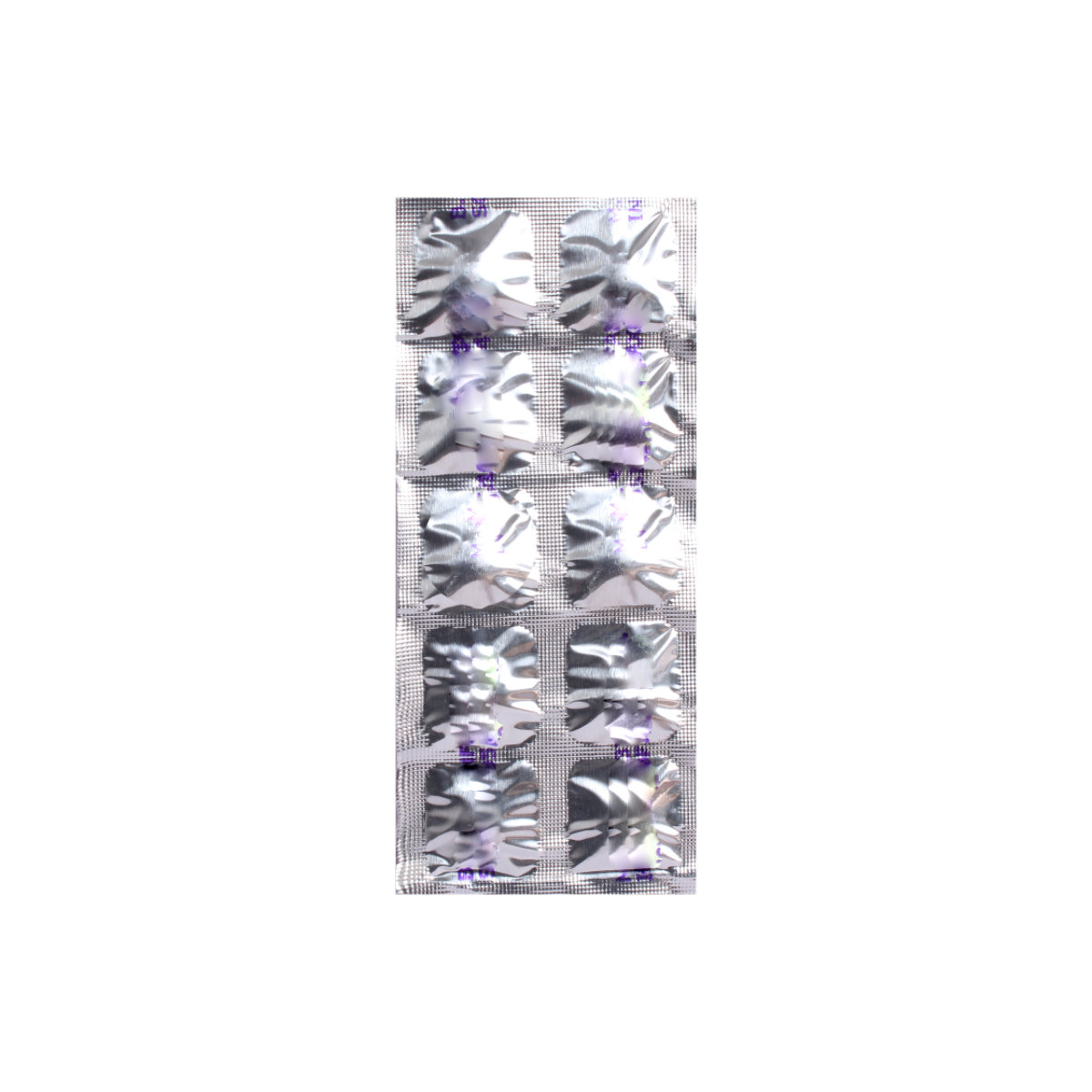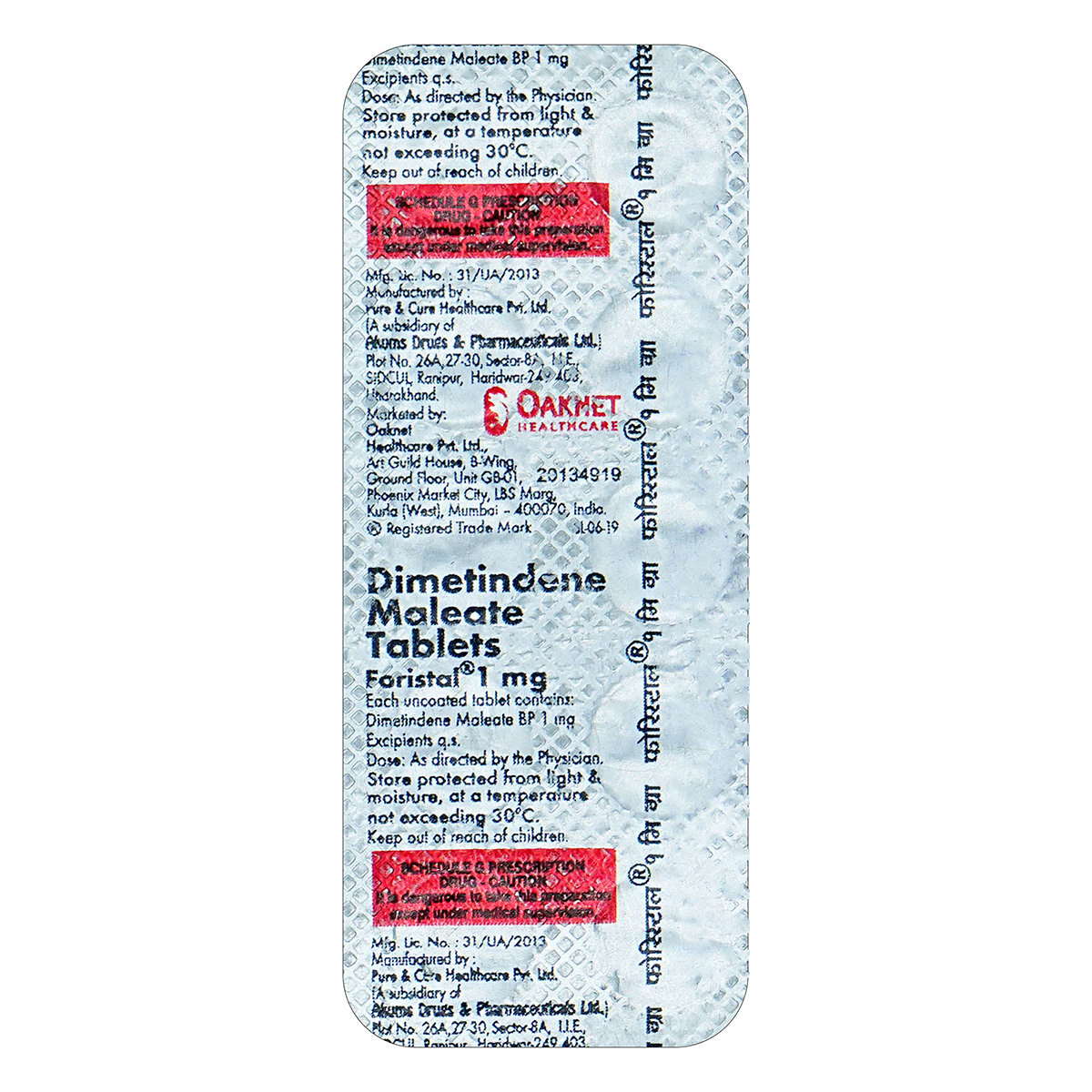Dimetindene
About Dimetindene
Dimetindene belongs to the 'antihistamine' class of drugs, primarily used to treat allergic reactions like urticaria, allergies of the upper respiratory tract like hay fever and perennial rhinitis, food and drug allergies, eczema (itchy inflamed skin), and pruritus (an irritating sensation that causes an urge to itch) in eruptive skin diseases. Allergy is an immune response produced by the body when exposed to foreign substances called allergens. Urticaria is a medical condition associated with skin rash triggered by food, medicine, and other allergens. Perennial rhinitis is an inflammatory condition characterised by nasal obstruction, sneezing, itching, and runny nose.
Dimetindene contains Dimetindene, which is an antihistamine/anticholinergic/anti-pruritic drug. It works by inhibiting the action of histamine. Histamines are chemical messengers that are released due to an allergic response in the body. These chemicals are known to cause allergies like itching, runny nose, sneezing and itchy eyes.
Your doctor will advise on how often you take Dimetindene based on your medical condition. Some common side effects of Dimetindene include drowsiness, headache, rash, nausea, excitability, fluid retention, fever, dry mouth and redness of the face. These side effects do not require medical attention and gradually resolve over time. If they persist longer, please seek medical advice.
Please do not use Dimetindene without consulting your doctor if you have any heart, liver and kidney diseases, and allergic reactions to Dimetindene and its components. It is advised to check with your doctor before using Dimetindene if you are pregnant, currently breastfeeding, or taking any other prescribed or non-prescribed medicines. Avoid driving or operating machines since Dimetindene can cause drowsiness and dizziness. Alcohol consumption may increase the side effects of Dimetindene, hence limit or avoid its intake during the course.
Uses of Dimetindene
Medicinal Benefits
Dimetindene contains Dimetindene, an antihistamine/anticholinergic drug. It treats signs and symptoms of allergic reactions like urticaria, eczema and pruritus in eruptive skin diseases. It is also used to treat allergies of the upper respiratory tract like hay fever and perennial rhinitis, food and drug allergies. Dimetindene works by blocking the action of histamine, a chemical that causes allergic symptoms like itching, runny nose, sneezing and itchy eyes.
Directions for Use
- Dimetindene can be taken with food or as directed by your doctor.
- It is best advised to take Dimetindene at the same time each day to get effective results.
- Swallow the tablet as a whole with a glass of water.
- Do not chew, crush or break it.
Storage
Side Effects of Dimetindene
- Drowsiness
- Headache
- Rash
- Nausea
- Excitability
- Fluid retention
- Fever
- Dry mouth
- Redness of the face
Drug Warnings
Do not use other over-the-counter medications, herbal or vitamin supplements without informing your pharmacist or doctor when you take Dimetindene. Before taking Dimetindene, let your doctor know if have a history of heart, liver or kidney diseases, glaucoma, urinary retention problems like prostatic enlargement, bronchial asthma, chronic obstructive pulmonary diseases, fits, and allergic reactions to Dimetindene or other medicines. It is advised to check with your doctor before using Dimetindene if you are pregnant or currently breastfeeding. Avoid driving or operating machines since Dimetindene may cause drowsiness and affect your ability to drive. Alcohol consumption may also intensify side effects like drowsiness, hence limit or avoid its intake during the course. Dimetindene is not recommended for infants less than one month of age, particularly premature infants.
Drug Interactions
Drug-Drug Interaction: Dimetindene may interact with other antihistamine drugs and depression medicines.
Drug-Food Interaction: Consumption of alcohol while using Dimetindene increases the risk of drowsiness. Hence avoid or limit the intake of alcohol.
Drug-Disease Interaction: Brief your medical history to the doctor if you have any heart, liver or kidney diseases, glaucoma, urinary retention problems like prostatic enlargement, bronchial asthma, chronic obstructive pulmonary diseases, and fits before starting Dimetindene.
Drug-Drug Interactions Checker List:
Safety Advice

Alcohol
cautionDimetindene may cause side effects like dizziness when used along with alcohol consumption. It is advised to avoid or limit alcohol intake during the course.

Pregnancy
cautionThere is limited data on Dimetindene affects pregnancy. Please consult your doctor if you are planning to become pregnant or already pregnant before starting Dimetindene.

Breast Feeding
cautionIt is not known if Dimetindene passes into the breast milk during breastfeeding. Please consult your doctor before starting Dimetindene if you are a nursing mother.

Driving
unsafeDimetindene may cause side effects like drowsiness which could affect your ability to drive. Do not drive or operate machinery in such cases. Drive only when you are mentally alert.

Liver
cautionLet your doctor know if you have any history of liver diseases. Your doctor will weigh the benefits and potential risks before prescribing Dimetindene.

Kidney
cautionLet your doctor know if you have any history of kidney diseases. Your doctor will weigh the benefits and potential risks before prescribing Dimetindene.

Children
cautionDimetindene is not recommended for infants less than one month of age, particularly premature infants. The dose may have to be adjusted by your doctor depending upon the condition of the children's disease and age.
Habit Forming
Diet & Lifestyle Advise
- Take the medication as directed by the doctor and at regular intervals.
- Manage stress, eat healthily, drink plenty of water, exercise regularly, and get plenty of sleep.
- Try to maintain good hygiene to keep your skin clean and irritant-free.
- Know your allergy triggers, such as pollen, dust and other factors.
- Avoid alcohol and limit caffeine consumption.
- Take plenty of liquids to avoid dehydration and dry mouth.
Special Advise
- Regularly monitor your blood pressure and blood glucose levels while using Dimetindene.
- Inform your doctor that you are using Dimetindene if you are advised any blood and urine examinations.
Patients Concern
Disease/Condition Glossary
Allergy is an immune response produced by the body in response to 'allergens,' which release 'histamines' into the blood. Histamines are the chemicals released into the body due to this immune response and cause a stuffy nose, watery eyes, itching nose/throat etc.
Urticaria is a medical condition associated with skin rash triggered by food, medicine, and other allergens.
Perennial rhinitis is an inflammatory condition characterised by nasal obstruction, sneezing, itching, and runny nose.
Eczema is an itchy inflammation of the skin that causes inflamed, itchy, cracked, and rough skin.
Pruritus is characterised by an irritating sensation that causes the urge to scratch the affected area.
Itching is caused by various conditions like hair regrowth, sunburns, insect bites, dry skin or healing wounds.
FAQs
Dimetindene is used to treat allergic conditions like urticaria, hay fever, perennial rhinitis, food and drug allergies, eczema (itchy inflamed skin), and pruritus (an irritating sensation that causes an urge to itch).
Dimetindene contains Dimetindene, an antihistamine drug. It works by inhibiting the action of histamine (chemicals that cause allergic symptoms), thus relieving symptoms like itching, sneezing and redness caused by allergic reactions.
Dimetindene should be used with caution in cases of glaucoma, urinary retention problems like prostatic enlargement, bronchial asthma, chronic obstructive pulmonary diseases, and fits. Also, let your doctor know if you have any allergic reactions to Dimetindene or other medicines.
Please do not stop taking Dimetindene even if you feel better. Complete the course, as suggested by the doctor.
Take Dimetindene as soon as possible. However, if it is time for the next dose, skip the missed dose and go back to your regular dosing schedule. Do not double the dose.
Keep Dimetindene away from direct sunlight at temperatures not exceeding 30°C. Store it according to the instructions labelled on the leaflet. Keep it out of reach of children and pets. Dispose of the unused and expired medicine.
Yes, Dimetindene can be taken with food or as directed by your doctor. However, it's best to take it at the same time each day. Do not chew, or break it.
The common side effects of Dimetindene are drowsiness, headache, rash, nausea, excitability, fluid retention, fever, dry mouth and redness of the face. If any these side effects persist or worsen, please consult your doctor.
Dimetindene can cause drowsiness in some people. You are recommended to avoid driving if you feel drowsy after taking Dimetindene. Drive only when you are mentally alert.
You are recommended to consult your doctor before taking other medicines with Dimetindene to avoid possible interactions.
Inform your doctor if you have any allergies to Dimetindene, if you have any pre-existing conditions like heart, liver, or kidney diseases, glaucoma, urinary retention problems, bronchial asthma, or chronic obstructive pulmonary diseases. Also, if you are breastfeeding, pregnant or planning pregnancy, let your doctor know. Avoid or limit alcohol consumption.





